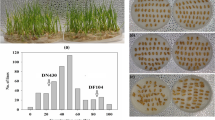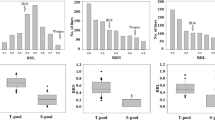Abstract
Key message
The QTL-seq approach was used to identify QTLs for spikelet fertility under heat stress in rice. QTLs were detected on chromosomes 1, 2 and 3.
Abstract
Rice is a staple food of more than half of the global population. Rice production is increasingly affected by extreme environmental fluctuations caused by climate change. Increasing temperatures that exceed the optimum temperature adversely affect rice growth and development, especially during reproductive stages. Heat stress during the reproductive stages has a large effect on spikelet fertility; hence, the yield decreases. To sustain rice yields under increasing temperatures, the development of rice varieties for heat tolerance is necessary. In this study, we applied the QTL-seq approach to rapidly identify QTLs for spikelet fertility under heat stress (air temperature of 40–45 °C) based on two DNA pools, each consisting of 25 individual plants that exhibited a heat-tolerant or heat-sensitive phenotype from an F2 population of a cross between M9962 (heat tolerant) and Sinlek (heat sensitive). Three QTLs, qSF1, qSF2 and qSF3, were detected on chromosomes 1, 2 and 3, respectively, according to the highest contrasting SNP index between the two bulks. The QTLs identified in this study were found to overlap or were linked to QTLs previously identified in other crosses using conventional QTL mapping. A few highly abundant and anther-specific genes that contain nonsynonymous variants were identified within the QTLs and were proposed to be potential candidate genes. These genes could be targets in rice breeding programs for heat tolerance.





Similar content being viewed by others
Abbreviations
- QTL:
-
Quantitative trait loci
- SNP:
-
Single-nucleotide polymorphism
- InDel:
-
Insertion/deletion
- HT:
-
Heat tolerant
- HS:
-
Heat sensitive
- qSF:
-
QTL of spikelet fertility
- kb:
-
Kilobase pair
- Mb:
-
Mega base pair
- BSA:
-
Bulk-segregant analysis
- DNA-seq:
-
DNA sequencing
- RNA-seq:
-
RNA sequencing
References
Aghamolki MTK, Yusop MK, Oad FC (2014) Heat stress effects on yield parameters of selected rice cultivars at reproductive growth stages. J Food Agric Environ 12:741–746
Anders S, Huber W (2010) Differential expression analysis for sequence count data. Genome Biol 11:R106. https://doi.org/10.1186/gb-2010-11-10-r106
Arikit S, Wanchana S, Khanthong S et al (2019) QTL-seq identifies cooked grain elongation QTLs near soluble starch synthase and starch branching enzymes in rice (Oryza sativa L.). Sci Rep 9:8328. https://doi.org/10.1038/s41598-019-44856-2
Bolger AM, Lohse M, Usadel B (2014) Trimmomatic: a flexible trimmer for Illumina sequence data. Bioinformatics 30:2114–2120. https://doi.org/10.1093/bioinformatics/btu170
Buu BC, Ha PTT, Tam BP et al (2014) Quantitative trait loci associated with heat tolerance in rice (Oryza sativa L.). Plant Breed Biotech 2:14–24. https://doi.org/10.9787/PBB.2014.2.1.014
Cheabu S, Moung-Ngam P, Arikit S et al (2018) Effects of heat stress at vegetative and reproductive stages on spikelet fertility. Rice Sci 25:218–226. https://doi.org/10.1016/j.rsci.2018.06.005
Cheabu S, Panichawong N, Rattanametta P et al (2019) Screening for spikelet fertility and validation of heat tolerance in a large rice mutant population. Rice Sci 26:229–238. https://doi.org/10.1016/j.rsci.2018.08.008
Chen G, Zhang Y, Ruan B et al (2018) OsHAK1 controls the vegetative growth and panicle fertility of rice by its effect on potassium-mediated sugar metabolism. Plant Sci 274:261–270. https://doi.org/10.1016/j.plantsci.2018.05.034
Counce PA, Keisling TC, Mitchell AJ (2000) A uniform, objective, and adaptive system for expressing rice development. Crop Sci 40:436. https://doi.org/10.2135/cropsci2000.402436x
Deveshwar P, Bovill WD, Sharma R et al (2011) Analysis of anther transcriptomes to identify genes contributing to meiosis and male gametophyte development in rice. BMC Plant Biol 11:78. https://doi.org/10.1186/1471-2229-11-78
Fu G, Zhang C, Yang Y et al (2015) Male parent plays more important role in heat tolerance in three-line hybrid rice. Rice Sci 22:116–122
Hatfield JL, Prueger JH (2015) Temperature extremes: effect on plant growth and development. Weather Climate Extrem 10:4–10. https://doi.org/10.1016/j.wace.2015.08.001
Huang X, Han B (2014) Natural variations and genome-wide association studies in crop plants. Annu Rev Plant Biol 65:531–551. https://doi.org/10.1146/annurev-arplant-050213-035715
Illa-Berenguer E, Van Houten J, Huang Z, van der Knaap E (2015) Rapid and reliable identification of tomato fruit weight and locule number loci by QTL-seq. Theor Appl Genet 128:1329–1342. https://doi.org/10.1007/s00122-015-2509-x
Ishimaru T, Hirabayashi H, Sasaki K et al (2016) Breeding efforts to mitigate damage by heat stress to spikelet sterility and grain quality. Plant Prod Sci 19:12–21. https://doi.org/10.1080/1343943X.2015.1128113
Jagadish SVK, Craufurd PQ, Wheeler TR (2007) High temperature stress and spikelet fertility in rice (Oryza sativa L.). J Exp Bot 58:1627–1635. https://doi.org/10.1093/jxb/erm003
Jagadish SVK, Septiningsih EM, Kohli A et al (2012) Genetic advances in adapting rice to a rapidly changing climate. J Agro Crop Sci 198:360–373. https://doi.org/10.1111/j.1439-037X.2012.00525.x
Kilasi NL, Singh J, Vallejos CE et al (2018) Heat stress tolerance in rice (Oryza sativa L.): identification of quantitative trait loci and candidate genes for seedling growth under heat stress. Front Plant Sci 9:1578. https://doi.org/10.3389/fpls.2018.01578
Kobata T, Ishi H, Iwasaki H (2017) A reduction in spikelet number and fertility causes yield vulnerability in high-yielding rice. Agron J 109:175–184
Kosugi S, Natsume S, Yoshida K et al (2013) Coval: improving alignment quality and variant calling accuracy for next-generation sequencing data. PLoS One 8:e75402. https://doi.org/10.1371/journal.pone.0075402
Krzywinski M, Schein J, Birol I et al (2009) Circos: an information aesthetic for comparative genomics. Genome Res 19:1639–1645. https://doi.org/10.1101/gr.092759.109
Li H, Durbin R (2009) Fast and accurate short read alignment with Burrows-Wheeler transform. Bioinformatics 25:1754–1760. https://doi.org/10.1093/bioinformatics/btp324
Li H-J, Xue Y, Jia D-J et al (2011) POD1 regulates pollen tube guidance in response to micropylar female signaling and acts in early embryo patterning in Arabidopsis. Plant Cell 23:3288–3302. https://doi.org/10.1105/tpc.111.088914
Lu H, Lin T, Klein J et al (2014) QTL-seq identifies an early flowering QTL located near Flowering Locus T in cucumber. Theor Appl Genet 127:1491–1499. https://doi.org/10.1007/s00122-014-2313-z
Luo X, Liu J, Zhao J et al (2018) Rapid mapping of candidate genes for cold tolerance in Oryza rufipogon Griff. by QTL-seq of seedlings. J Integr Agric 17:265–275. https://doi.org/10.1016/S2095-3119(17)61712-X
Matsui T, Omasa K, Horie T (2000) High temperature at flowering inhibits swelling of pollen grains, a driving force for thecae dehiscence in rice (Oryza sativa L.). Plant Prod Sci 3:430–434. https://doi.org/10.1626/pps.3.430
Matsui T, Omasa K, Horie T (2001) The difference in sterility due to high temperatures during the flowering period among japonica-rice varieties. Plant Prod Sci 4:90–93. https://doi.org/10.1626/pps.4.90
Nishida S, Dissanayaka DMSB, Honda S et al (2017) Identification of genomic regions associated with low phosphorus tolerance injaponica rice (Oryza sativa L.) by QTL-Seq. Soil Sci Plant Nutr 64:1–4. https://doi.org/10.1080/00380768.2017.1412238
Pascual L, Albert E, Sauvage C et al (2016) Dissecting quantitative trait variation in the resequencing era: complementarity of bi-parental, multi-parental and association panels. Plant Sci 242:120–130. https://doi.org/10.1016/j.plantsci.2015.06.017
Patro R, Duggal G, Kingsford C (2015) Accurate, fast, and model-aware transcript expression quantification with Salmon. BioRxiv. https://doi.org/10.1101/021592
Peng S, Huang J, Sheehy JE et al (2004) Rice yields decline with higher night temperature from global warming. Proc Natl Acad Sci USA 101:9971–9975. https://doi.org/10.1073/pnas.0403720101
Prasad PVV, Boote KJ, Allen LH et al (2006) Species, ecotype and cultivar differences in spikelet fertility and harvest index of rice in response to high temperature stress. Field Crops Res 95:398–411. https://doi.org/10.1016/j.fcr.2005.04.008
Prasanth VV, Babu, Basava RK et al (2017) Trait and marker associations in oryza nivara and O. rufipogon derived rice lines under two different heat stress conditions. Front Plant Sci 8:1819. https://doi.org/10.3389/fpls.2017.01819
Takagi H, Abe A, Yoshida K et al (2013) QTL-seq: rapid mapping of quantitative trait loci in rice by whole genome resequencing of DNA from two bulked populations. Plant J 74:174–183. https://doi.org/10.1111/tpj.12105
Tazib T, Kobayashi Y, Koyama H, Matsui T (2015) QTL analyses for anther length and dehiscence at flowering as traits for the tolerance of extreme temperatures in rice (Oryza sativa L.). Euphytica 203:629–642. https://doi.org/10.1007/s10681-014-1291-1
Wei H, Liu J, Wang Y et al (2013) A dominant major locus in chromosome 9 of rice (Oryza sativa L.) confers tolerance to 48 °C high temperature at seedling stage. J Hered 104:287–294. https://doi.org/10.1093/jhered/ess103
Yaobin Q, Peng C, Yichen C et al (2018) QTL-Seq identified a major QTL for grain length and weight in rice using near isogenic F2 population. Rice Sci 25:121–131. https://doi.org/10.1016/j.rsci.2018.04.001
Ye C, Argayoso MA, Redoña ED et al (2012) Mapping QTL for heat tolerance at flowering stage in rice using SNP markers. Plant Breed 131:33–41. https://doi.org/10.1111/j.1439-0523.2011.01924.x
Ye C, Tenorio FA, Argayoso MA et al (2015) Identifying and confirming quantitative trait loci associated with heat tolerance at flowering stage in different rice populations. BMC Genet 16:41. https://doi.org/10.1186/s12863-015-0199-7
Zhao Z, Jiang L, Xiao Y et al (2006) Identification of QTLs for heat tolerance at the booting stage in rice (Oryza saliva L.). Zuo wu xue bao 32:640–644
Zhao L, Lei J, Huang Y et al (2016) Mapping quantitative trait loci for heat tolerance at anthesis in rice using chromosomal segment substitution lines. Breed Sci 66:358–366. https://doi.org/10.1270/jsbbs.15084
Zhu S, Huang R, Wai HP et al (2017) Mapping quantitative trait loci for heat tolerance at the booting stage using chromosomal segment substitution lines in rice. Physiol Mol Biol Plants 23:817–825. https://doi.org/10.1007/s12298-017-0465-4
Acknowledgements
This work was supported by the Agricultural Research Development Agency (ARDA) (Grant No. PRP5905021150).
Author information
Authors and Affiliations
Contributions
SW, CM, TT, AV and SA conceived and designed the experiment. PN, SC and VR conducted the experiments. SW and CS analyzed the data. SW, SA and PN wrote the manuscript. SW and SA revised the final version of the paper. All authors approved the final version of the manuscript.
Corresponding author
Ethics declarations
Conflict of interest
The authors declare that they have no conflicts of interest.
Additional information
Communicated by Roger Thilmony.
Publisher's Note
Springer Nature remains neutral with regard to jurisdictional claims in published maps and institutional affiliations.
Electronic supplementary material
Below is the link to the electronic supplementary material.
299_2019_2477_MOESM1_ESM.xlsx
Supplementary material 1: Table S1. List of genes annotated within the detected QTLs on chromosomes 1, 2 and 3 and the expression of these genes in the anthers of M9962 and Sinlek. (XLSX 19 kb)
Rights and permissions
About this article
Cite this article
Nubankoh, P., Wanchana, S., Saensuk, C. et al. QTL-seq reveals genomic regions associated with spikelet fertility in response to a high temperature in rice (Oryza sativa L.). Plant Cell Rep 39, 149–162 (2020). https://doi.org/10.1007/s00299-019-02477-z
Received:
Accepted:
Published:
Issue Date:
DOI: https://doi.org/10.1007/s00299-019-02477-z




